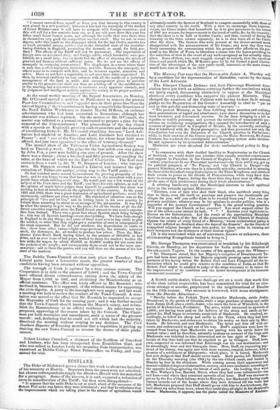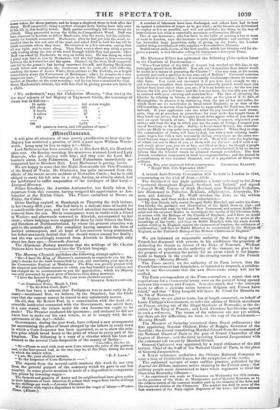SCOTLAND.
The Duke of Richmond gave a dinner last week to about two hundred of his tenantry at Bundy. Reporters from the press were not admitted, but chance correspondents supply the Aberdeen Herald with the materials for a paragraph. Some of the tenants, it is said, expected a reductionof rents in consideration of the Tariff ; but they were disappointed--
" It appears that the noble Duke is not so much afraid of the measures of Sir Robert Peel as he was before they were introduced ; and that he calculates that the improvements which are taking place in the science of agriculture would
ultimately enable the farmers of Scotland to compete successfully with those of any other country in the world. With a view to encourage these improve- ments, his Grace stated, that henceforth he is to give premiums to the extent of 100/ per annum, for improvements in the breed of cattle, &c. by his tenantry; that the show is to be held at Gordon Castle; and that, instead of dining his tenantry on the three estates separately, he is to dine them all at the Castle after the show. The farmers who were present at the dinner seemed much disappointed with the announcement of his Grace; and next day they were freely canvassing the commentary which his present offer affords on his pro- posal in the House of Peers, to introduce a clause into the leases providing for the reduction of rent in the event of any such emergency as has actually taken place. Some of them, too, were waggish enough to remark, that the excellent dinner and punch which Mr. M'Kenzie gave for 3s. 6d. formed a good illustra- tion of the advantages of the new cattle-tariff, inasmuch as the same dinner would have cost at least 4s. in 1841."
The Morning Post says that the Honourable James A. Wortley will be a candidate for the representation of Buteshire, vacant by the death of the Lord Advocate.
The Glasgow Church Defence and Anti-Patronage Electoral Asso- ciation have put forth an address carrying further the resolutions which we lately copied, threatening obstinately to oppose at the Municipal elections every candidate who supports the present Ministry. They charged the members of the Cabinet with having broken their solemn pledge to the Deputation of the General Assembly in 1841 to "put an end to this painful and distressing state of matters"—
" The present Ministry, so far from fulfilling their promises and realizing their protestations of regard and attachment, have shown themselves to be her most inveterate and determined enemies. So far from bringing in a bill to regulate or modify patronage, and prevent the intrusion of unacceptable pre- sentees on reclaiming congregations, they opposed the introduction of such a measure of partial relief by Campbell of Mouzie, by the unworthy subterfuge that it interfered with the Royal prerogative, and thus prevented not only the introduction but even the discussion of the Church question in Parliament; while, in their exercise of the Crown patronage, the Home Secretary, SirJames Graham, has rendered this unscriptural and degrading system more intolera- ble and oppressive by its tyrannical Administration." Ministers are even attacked for their ecclesiastical policy in Eng- land—
" In connexion with their decided hostility to Nonintrueion in the Church of Scotland, we would desire you consider their equally manifest countenance and support to Puseyism in the Church of England. By their professions of ardent attachment to our Protestant institutions'—by their artful cry, got up for political purposes, of No Popery,' and the Church in Danger'—the present Ministers, who were then in a miserable minority, succeeded in arousing the fears of the friends ofevangelical religion in the Three Kingdoms, and obtained their return to power as the friends of Protestantism, while they have done more to encourage Popery, during the short time they have been in office, than all the acts of their predecessors during their whole administration." A stirring battle-cry calls the Municipal electors to their spiritual duty in the crusade against Ministers- " Electors, sons of men who shed their blood, who sacrificed every thing dear to them, even life itself, to purchase and preserve the inestimable pri- vileges for you, will you suffer them to be wrested from you? Can you sup- port any candidate, whatever may be his opinions in secular politics, who is supporter of the present Government? This is the grand testing question. Will you support the Church or her enemies ? You must support either the
one or the other—you cannot do both. * * Exercise your legitimate in- fluence on the Government. Let the result of the approaching Municipal elections be an index of the fate Of the persecutors of the Church of Scotland. Oppose the return of every friend of a Ministry,' whose ecclesiastical policy is the worst inflicted on Scotland since the days of the Stuarts.' As the friends of evangelical religion brought them into power, let them unite in turning out their betrayers and the destroyers of their dearest rights." [It is not mentioned what set of statesmen, known or unknown, these electioneering Evangelicals intend to bring in.] Mr. George Thompson was entertained at breakfast by his Edinburgh friends, on Monday, on his departure for India under the auspices of Dwarkanauth Tagore. In the course of his speech, says the Witness- " Mr. Thompson stated, that her Majesty's reception of Dwarkanauth Ta- gore had been most gracious ; her Majesty urgently pressing upon him the im- portance of his laying before Sir Robert Peel and Lord Fitzgerald all the in- formation which he could give relative to the condition of India, so that Sir Robert Peel might be enabled to judge of the steps necessary to be taken for the improvement of its condition and the better development of its immense commercial resources."
A Scotch cattle-dealer, whose dealings are on a scale that mark him of the class called respectable, has been committed for trial for an atro- cious attempt at murder, perpetrated in the neighbourhood of Dundee on the 13th instant. Our account is borrowed, with some abridgment, from the Dundee Advertiser- " Shortly before the Falkirk Tryst, Alexander Mackenzie, cattle dealer, m
Dmhead i
, n the pariah of Gleniela, made a large purchase of sheep and cattle from James Duff, also a cattle-dealer, who rents the farm of Whitefield, in the parish of Kirkmichael, Perthshire. The price, which amounted to upwards of 1,000/, not having been paid on the delivery of the sheep and cattle as bar- gained for, Duff began to entertain suspicions of Mackenzie. Be resolved, ac- cordingly, to follow his sheep and cattle to the Tryst, where they had been taken by Mackenzie, and endeavour to obtain his money on their sale by Mac- kenzie. He followed, and met Mackenzie. The latter put him off with ex- cuses, and endeavoured to get out of his way. Duff's suspicions were here in- creased from hearing that Mackenzie was parting with his cattle below the market value ; and he therefore, naturally anxious on account of the large suin Mackenzie was indebted to him, determined not to lose eight of him. Mac- kenzie at this time held out that he required to go to Glasgow. Duff, how- ever, suspected or was informed that Edinburgh was his real destination; and he accordingly went and met him again there. Here, Duff, on requesting pay- ment of his money, was again met with more excuses, coupled, however, with a promise of a settlement at Blairgowrie ; which place it is feared, Mackenzie had now designed that Duff should never reach. Both parties left Edinburgh on the Thursday morning (the 13th) by the ten o'clock coach, and landed in Dundee by four in the afternoon. While coming across, their appearance and manner exhibited degrees of abstraction, anxiety, and even confusion, according to the opposite feelings notating the breast of each party. On landing, they went to Mrs. Wallace's Inn, Barrack Street, where they had some refreshment—tea and ham—and where they remained upwards of an boar. Duff was anxious to get on by the five o'clock railway-train to New tyle ; but Mackenzie having made various errands out of the house, where they were detained till the train had left, Mackenzie proposed that Duff should go on with him to Auchterhouse, dis- tant about six miles from town, where they could sleep all night in his shepherd's house. Mackenzie, it appears, has the parks called the Meadows of Auchter- house taken for sheep-pasture, and he keeps a shepherd there to look after the sheep. Duff consented ; being a perfect stranger here, having been only once in his life in this locality before. Both parties accordingly left town about six o'clock. They proceeded across the fields, to Camperdown Wood. Duff was here observed to hesitate to follow Mackenzie into the wood; but he, unfortu- nately for himself, consented. Mackenzie, after he had got into the wood, re- marked that be was not sure of the road, and asked Duff to hold his hat till he could ascertain where they were. He returned in a few minutes, saying that all was right, and to come along. They then went a short way along a green walk leading along the aide of the wood through which they had passed ; when Duff ass asked by Mackenzie to step on before him. He was doing so, when a pistol was fired at him by Mackenzie, and the ball lodged in him—entering between the left shoulder and the spine. Stunned by the shot, Duff staggered, and fell to the ground ; but having recovered himself, and fearing Mackenzie would follow and complete the murderous act, he made off; with difficulty reaching the house of James White, farm-servant to Mr. Portullo, on a height immediately above the Cottartown of Baldragon: %there he remains in a very dangerous state." Information was given to the Police Mackenzie was appre- hended at Dundee on the next morning; and he has been committed for trial. Since Mackenzie's seizure, his wife has died in giving premature birth to a child.
"We understand," says the Caledonian Mercury, "that dining the few days' sojourn of her Majesty at Taymouth Castle, the consumpt of vivers was as follows- 10 cattle 445 stones weight. 163 sheep 528 " 9 lambs 15 tI
3 calves 27
I pig 4 JP
■ ■
186 1,019 .
887 quartern loaves, and 109 gallons of aqua."



























 Previous page
Previous page